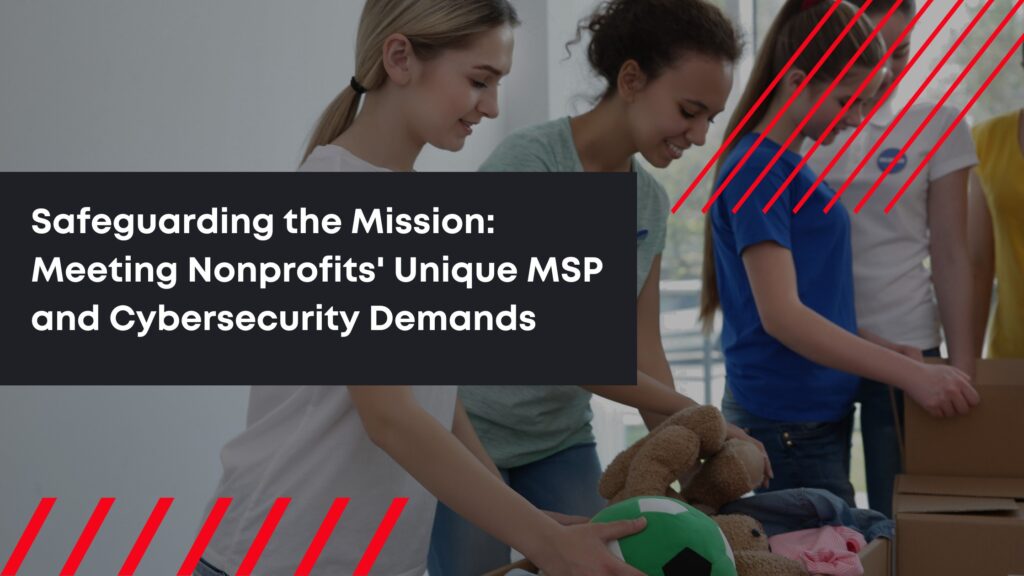Nonprofit organizations are crucial in addressing societal needs, making their operations and data protection paramount. In today’s digital age, managed service providers (MSPs) and cybersecurity are essential components of their success. However, non-profits face unique challenges and vulnerabilities that require tailored solutions. In this blog post, we will explore the distinctive needs of non-profits in terms of MSP and cybersecurity and discuss how MSPs can support them effectively.
Understanding Nonprofits’ Distinctive Requirements:
Limited Resources:
Nonprofits often operate on tight budgets, with limited funds allocated to technology and cybersecurity. To address this, MSPs need to offer cost-effective solutions and flexible pricing models. By understanding the financial constraints non-profits face, MSPs can create customized packages that meet their specific needs without straining their resources.
Mission-Driven Focus:
Nonprofits prioritize their mission over profit, shaping their IT strategies differently from traditional businesses. MSPs serving non-profits must have expertise in aligning technology solutions with the organization’s mission and goals. This alignment ensures that technology supports the delivery of services, enhances outreach efforts, and promotes the organization’s overall mission.
Diverse Stakeholders:
Non-profits have complex networks of stakeholders, including volunteers, board members, donors, and beneficiaries. Each stakeholder brings different needs and potential cybersecurity risks. MSPs must implement security measures that encompass these varied stakeholders, facilitating efficient collaboration while ensuring data integrity and protection.
Tailoring MSP and Cybersecurity Solutions for Nonprofits:
Comprehensive Risk Assessment:
A thorough risk assessment is crucial for non-profits to identify vulnerabilities specific to their operations. MSPs can assist in this process, working closely with non-profits to identify potential security gaps and provide recommendations for remediation. This collaborative effort ensures a targeted and effective cybersecurity strategy.
Data Protection and Privacy:
Non-profits handle sensitive donor information, financial data, and beneficiary records. Protecting this data is of utmost importance. MSPs can help implement robust data protection measures, including encryption, secure backups, and access controls. By securing these critical assets, non-profits can establish trust and maintain donor confidence.
Employee Training and Awareness:
Human error is a significant contributor to cybersecurity breaches. MSPs can play a vital role in educating non-profit staff about cybersecurity best practices, such as strong password management and recognizing phishing attempts. MSPs can facilitate ongoing training programs, empowering non-profit employees with the knowledge and skills needed to mitigate cyber threats effectively.
Continuity Planning and Disaster Recovery:
Non-profits must ensure business continuity in the face of cyberattacks or data breaches. MSPs can assist in creating robust disaster recovery plans, including regular backups, off-site data storage, and contingency strategies. These measures minimize downtime, safeguard critical operations, and enable non-profits to quickly resume their mission-driven work.
The Role of MSPs in Supporting Nonprofits:
Proactive Monitoring and Threat Detection:
MSPs can continuously monitor networks, identify potential security threats, and respond promptly to minimize damage. By implementing intrusion detection systems, vulnerability assessments, and real-time threat intelligence, MSPs offer non-profits an added layer of protection, allowing them to focus on their core activities.
Managed Patching and Updates:
Timely patching and software updates are crucial for mitigating vulnerabilities. MSPs can assume the responsibility of managing and maintaining software patches and updates, ensuring that non-profits stay protected without burdening their internal resources. This proactive approach prevents the exploitation of known vulnerabilities.
Compliance and Regulatory Considerations:
Non-profits often face unique compliance requirements, such as donor privacy regulations or industry-specific guidelines. MSPs familiar with
these regulations can assist non-profits in meeting compliance standards. By ensuring legal and ethical operations, MSPs help non-profits maintain the trust of their stakeholders.
Conclusion:
Non-profit organizations operate in a distinct landscape, facing specific challenges and vulnerabilities. MSPs that understand these unique needs play a crucial role in fortifying non-profit cybersecurity defenses. By offering tailored solutions, comprehensive risk assessments, data protection measures, and ongoing support, MSPs enable non-profits to focus on their mission with confidence. Safeguarding non-profits is a collaborative effort, and MSPs are valuable partners in ensuring their digital resilience and success.

